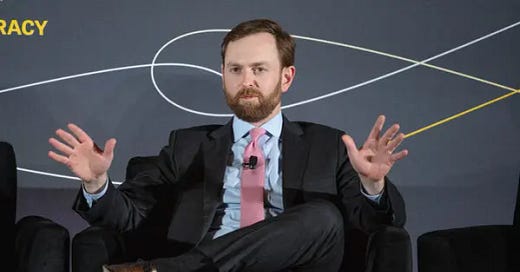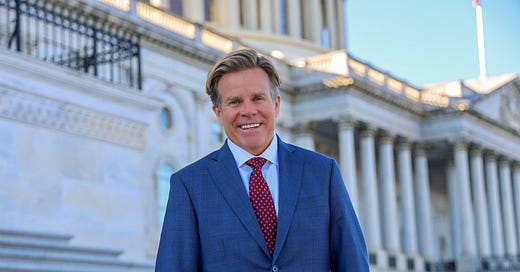
Exclusive: FTC Commissioner Andrew Ferguson on bipartisanship, AI regulation, and how to succeed on the Hill
FTC Commissioner Andrew Ferguson spoke with the Washington Reporter about his career and his goals at the Commission.
Republican Commissioner of the Federal Trade Commission (FTC) Andrew Ferguson clerked for U.S. Supreme Court Justice Clarence Thomas, was Sen. Mitch McConnell’s (R., Ky.) chief counsel, and became the solicitor general of Virginia — all in less than 12 years after earning his law degree from the University of Virginia — before he was sworn into his current role on April 4.
Ferguson explained in an interview with the Reporter why commissioners divide into partisanship (“when the commission is pushing the envelope”); when the FTC should work with foreign regulators (“we should never ask our enforcement partners abroad to do our dirty work. We cannot use foreign enforcers to circumvent limits on our own authority”); and how to succeed on the Hill (“first, be patient and charitable to everyone. You should do this because it is virtuous. If St. Thomas and Aristotle don’t convince you, do it because it’ll help you in the long run”).
Washington Reporter:
You said in the opening statement for your Senate hearing that “consumer protection and competition are not partisan issues.” But from the outside, it seems like the FTC has become more partisan. Is bipartisanship dead at the FTC? Or does the Commission still cooperate on most things — especially investigations — and we only see part of the story through the press?
Andrew Ferguson:
First of all, thanks for asking me to do this Q&A. And congratulations on starting the Washington Reporter. I’ve been a Republican staffer on the Hill, and I know there is a huge demand for what you all are doing. I look forward to reading your work!
I stand by what I said at my hearing. The bread and butter of what the Commission does remains very much bipartisan. For both competition and consumer protection matters, most of our investigative and enforcement decisions are unanimous. They are generally based on well-established legal theories. I think we divide into partisan camps when the Commission is pushing the envelope. This comes up most frequently in rulemaking. I take a pretty conservative view of lawmaking by federal agencies. We’re supposed to be a self-governing people, and I don’t think we should let unelected technocrats living inside the Beltway tell us how to live. I’ve dissented from a couple rules already, including the giant Non-Compete Rule issued a few weeks ago. I’ll continue speaking out when I think the Commission wields authority Congress has not given us. I’ve also dissented from enforcement actions like Exxon Mobil/Pioneer Natural Resources where I think the agency is pushing aggressive enforcement theories that are tough to justify under the texts of the statutes we’re enforcing. I’m hopeful that Commissioner Melissa Holyoak and I can help move the Commission back toward the bipartisanship for which it was so long known.
Washington Reporter:
Some advocates have called for the FTC to establish frameworks for Artificial Intelligence (AI). In your Senate hearing, you said Congress needs to take this role instead.
Have any industry developments since then changed your mind on the propriety of the FTC playing a role in this space?
Andrew Ferguson:
There’s a tendency to think that every aspect of AI demands a special regulatory regime. But the truth is that committing fraud with AI, deceiving consumers about AI-enabled products, or colluding with competitors using AI are just as illegal as doing the same things without AI. When people use AI to violate the antitrust laws or the other laws the Commission enforces, we should act. But when people urge the Commission to “regulate AI,” they are not talking about that. They are urging the Commission to regulate AI comprehensively and issue a rash of rules to that effect. I don’t think we have the power to do that. The only federal institution with that sort of power and competence is Congress.
If Congress is going to legislate on AI, I think it’s critically important that it carefully avoid erecting barriers to entry that would insulate Big Tech from competition. The last thing Congress should do is adopt regulations that prevent promising newcomers from using AI to challenge big tech dominance.
Washington Reporter
What’s been your biggest surprise since joining the Commission?
Andrew Ferguson:
How busy the Commission is and the speed at which it moves. I had the impression that it operated at a judicial pace, but it moves matters much more quickly than that. I think part of that was the timing of my arrival. The Commission had major enforcement actions and rulemakings teed up for decision right when I arrived, and it took a lot of work to get up to speed. I couldn’t have done it without the help of the FTC staff lawyers and economists, who are consummate professionals and the lifeblood of the agency. But there’s no doubt that the Commission is moving at a breakneck pace, especially on the rulemaking front. I think we’re going to be pretty busy for the next several months.
Washington Reporter:
What is your perspective on the FTC’s role in working with foreign entities — especially the European Commission — on antitrust enforcement? Is this the proper role for the Commission?
Andrew Ferguson:
Whether we like it or not, markets are global. American companies do business abroad, and foreign companies do business here. There are therefore many instances where we must collaborate with our international counterparts on enforcement matters. This is especially true when we are trying to obtain evidence from a foreign witness or third party. Our regular engagement with foreign counterparts also helps promote a more consistent, principled application of antitrust laws across the globe, which can safeguard U.S. companies from the potentially protectionist application of antitrust laws in other countries. But we should never ask our enforcement partners abroad to do our dirty work. We cannot use foreign enforcers to circumvent limits on our own authority.
Washington Reporter:
You went from working in the Senate to serving as solicitor general for Virginia, and now you’re a Senate-confirmed FTC commissioner.
I suspect many — if not all — of our Hill staff readers would love to have a similar career trajectory. What is one piece of advice that you would give to young Hill staff looking to succeed?
Andrew Ferguson:
This is tough to answer. I’ve tried to work hard, but I’ve been the beneficiary of tremendous and unexpected good fortune. I’ve tried to conduct myself in every position I’ve held like I was placed there for a reason, and to honor God and my family. I guess I’ve learned a couple things along the way. First, be patient and charitable to everyone. You should do this because it is virtuous. If St. Thomas and Aristotle don’t convince you, do it because it’ll help you in the long run. You never know which acquaintance or colleague will wind up in a position of influence, and the last thing you want is for that person to remember you as unkind. Second, pursue excellence and do the right thing no matter the cost. Don’t pull your punches with an eye to the next opportunity. That next opportunity may never come, and either way you’ll likely regret compromising your principles. Finally, live frugally. Career-making opportunities often come out of the blue, and with a pay cut. If you live frugally, you can accept the unexpected offers when they arrive. Don’t willingly take the golden handcuffs.










